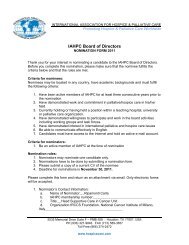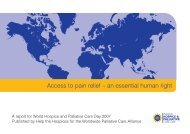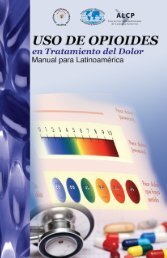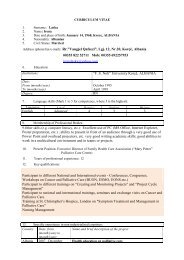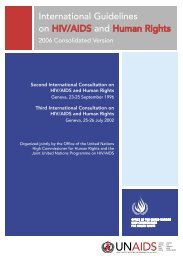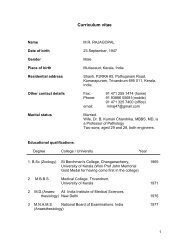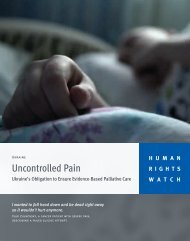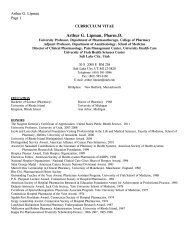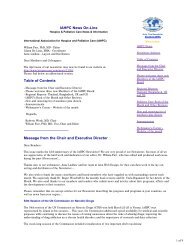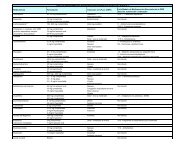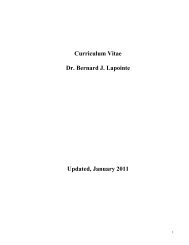INTERIGHTS Bulletin
INTERIGHTS Bulletin
INTERIGHTS Bulletin
You also want an ePaper? Increase the reach of your titles
YUMPU automatically turns print PDFs into web optimized ePapers that Google loves.
198 <strong>INTERIGHTS</strong> <strong>Bulletin</strong><br />
Volume 16 Number 4 2011<br />
anything, the government has to do to<br />
facilitate compliance. 21<br />
Another concern in the US has been<br />
the lack of an automatic review system.<br />
Unless a patient decides to ask for a<br />
court hearing the detention order will<br />
be implemented without judicial<br />
oversight. Where deprivation of liberty<br />
of the most vulnerable is concerned it<br />
is important that there be an automatic<br />
review of the decision. 22 Of more<br />
concern is the fact that in California as<br />
late as 1999 TB patients were being<br />
tried and detained in prisons. 23<br />
In Ireland s 38 of the Public Health Act<br />
of 1947, as amended, allows two<br />
authorised medical practitioners to<br />
order the detention of TB patients if<br />
‘such person is a probable source of<br />
infection with an infectious disease<br />
and that his isolation is necessary as a<br />
safeguard against the spread of<br />
infection, and that such person cannot<br />
be effectively isolated in his home.’<br />
The section allows an appeal to the<br />
Minster of Health and Article 40.4.2 of<br />
the Irish Constitution entitles all<br />
persons in detention to apply at any<br />
time to the High Court for a review of<br />
their detention. Section 38 has serious<br />
gaps in that it allows medical<br />
personnel, without court supervision,<br />
to order detention, there is no<br />
automatic and periodic review of the<br />
detention and there is no statutory<br />
provision of legal aid. However the<br />
High Court has upheld s 38, despite<br />
criticising it for a lack of internal<br />
safeguards and the manner in which<br />
the particular case was managed by the<br />
medical staff, based on the<br />
presumption of constitutionality,<br />
holding that the hospital and medical<br />
practitioners in charge should have<br />
developed a rights-based plan to<br />
ensure that the patient’s case was<br />
reviewed periodically (both in terms of<br />
the legality of her detention and her<br />
continued infectiousness). 24 The<br />
judge also emphasised other methods<br />
of enforcing the patient’s rights, which<br />
in this case included the ability to<br />
petition the High Court under Article<br />
20.4.2 of the Constitution. Therefore,<br />
although it is desirable that safeguards<br />
be contained in legislation (and it can<br />
be argued that the judge in this case<br />
was excessively deferential to the<br />
legislature) the decisive question will<br />
be whether they exist at all, whether in<br />
legislation, policy or administrative<br />
action.<br />
In South Africa ‘authorities may detain<br />
an individual suffering from an<br />
infectious disease until the disease<br />
ceases to present a public health risk;<br />
draft government policy guidelines call<br />
for the isolation of all MDR- and XDR-<br />
TB patients in a specialist facility for a<br />
minimum of six months.’ 25 Unlike in<br />
the UK, US and Australia, where<br />
isolation is utilised as a last resort and<br />
where modern and up-to-date<br />
treatment is available, thousands of<br />
patients in South Africa are detained in<br />
specialised TB hospitals, where many<br />
die:<br />
(I)ndividuals with drug-resistant TB<br />
(are isolated) for as long as two years,<br />
often in conditions closely resembling<br />
prisons. In other locations, XDR-TB<br />
patients are discharged after six<br />
months to “make room for new<br />
patients.” In both cases, no assessment<br />
of infectiousness is made, and<br />
throughout their confinement, most<br />
patients do not have access to many<br />
second-line drugs, resulting in almost<br />
universal mortality. In March 2009,<br />
the AIDS Law Project reported that<br />
approximately 1,700 people, including<br />
children, were then detained in TB<br />
isolation facilities, many of them in<br />
substandard conditions that violated<br />
South African constitutional rights and<br />
national health legislation. 26<br />
Importantly, many of the safeguards<br />
guaranteed under international law are<br />
ignored under South African<br />
legislation: the determination to<br />
forcibly isolate a patient is made by a<br />
health official, who is not required to<br />
consider whether less intrusive<br />
methods would be more appropriate;<br />
there are insufficient procedures to<br />
allow judicial review of the decision to<br />
detain (there is no automatic review<br />
and access to legal representation is<br />
limited); most people forcibly isolated<br />
are not refusing to take treatment<br />
(meaning that isolation is not<br />
necessary to ensure compliance); most<br />
are only isolated fourteen weeks after<br />
first being tested (allowing them to<br />
spread the disease before they are<br />
isolated) and the process is<br />
discriminatory as it only applies to<br />
individuals accessing the public health<br />
system since patients who can afford<br />
private doctors are treated at home. In<br />
addition, when considering whether<br />
the limitation is proportionate, a<br />
determining factor may be that, ‘public<br />
health experts note that holding MDRand<br />
XDR-TB patients in overcrowded<br />
hospitals with inadequate ventilation<br />
increases the risk of nosocomial<br />
disease transmission and crossinfection.’<br />
27 In these circumstances it<br />
would be difficult to defend the South<br />
African programme of detaining TB<br />
patients in overcrowded hospitals as a<br />
legitimate limitation to the right to<br />
liberty under the South African<br />
Constitution and international and<br />
regional human rights law.<br />
General Principles From International<br />
Practice<br />
The comparison of various approaches<br />
towards coercive isolation for patients<br />
with MDRTB indicates that there are<br />
some basic conditions for the legality<br />
of the process. Coercive isolation must<br />
always be a last resort after other<br />
measures, such as directly observed<br />
therapy, have been attempted. Social<br />
support, including economic<br />
assistance and counselling, should be<br />
provided to patients who should be<br />
warned of the possible ramifications of<br />
default before any action is taken. The<br />
process itself must ensure protection<br />
of fair trial rights with either<br />
administrative or judicial supervision<br />
of the decision to detain and on-going<br />
review of the detention. Finally<br />
patients should be detained in<br />
hospitals or other facilities for their<br />
treatment and not in open prison with<br />
convicted criminals. While not all<br />
these principles are fully met in each of<br />
the countries studied, the procedure<br />
adopted in each country, including to<br />
some extent South Africa,<br />
demonstrates an attempt to balance<br />
the rights of the individual patient with



